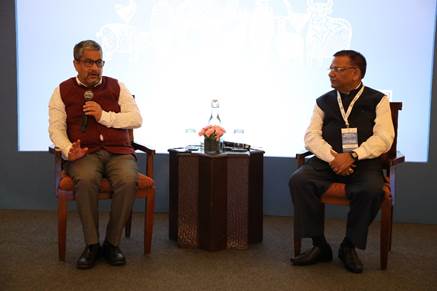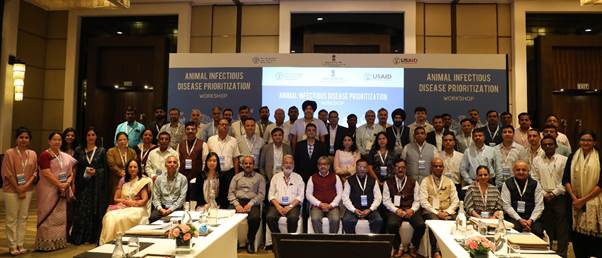Ministry of Fisheries, Animal Husbandry & Dairying
Dr Abhijit Mitra, the Animal Husbandry Commissioner inaugurates Animal Infectious Disease Prioritization Workshop inaugurated at New Delhi
Dr. Mitra underscored the critical role that economic losses play as a key criterion in the process of disease prioritization
Animal Husbandry Commissioner advocated for the inclusion of biodiversity loss as a vital criterion in the disease prioritization process
प्रविष्टि तिथि:
28 AUG 2024 6:38PM by PIB Delhi
A three-day workshop on Animal Infectious Disease Prioritization organised by The Food and Agriculture Organization of the United Nations (FAO) under the aegis of the Department of Animal Husbandry & Dairying, Ministry of Fisheries Animal Husbandry and Dairying, Government of India was commenced today at New Delhi.
The workshop, which was inaugurated by Dr Abhijit Mitra, the Animal Husbandry Commissioner (AHC), Department of Animal Husbandry & Dairying, underscored the critical role that economic losses play as a key criterion in the process of disease prioritization. Dr Mitra emphasized that the economic impact of infectious diseases, particularly those affecting livestock, poultry, and wildlife, cannot be overlooked when determining which diseases should be prioritized for prevention and control efforts. Dr. Mitra pointed out that the financial burden associated with these diseases—ranging from reduced productivity to costs incurred through treatment and control measures—has a far-reaching consequence not only for the agricultural sector but also for the national economy as a whole.

In addition to economic losses, the Animal Husbandry Commissioner advocated for the inclusion of biodiversity loss as a vital criterion in the disease prioritization process. He highlighted that the loss of biodiversity, which often results from the spread of infectious diseases among wildlife and other species, has long-term implications for ecosystems and the services they provide. By factoring in the impact on biodiversity, the prioritization process becomes more holistic, recognizing the interdependence between animal health, environmental sustainability, and human well-being.
Dr Raj Kumar Singh, Epidemiology, AMR and Zoonoses Specialist, FAO India gave a detailed overview on the process of the Animal Infectious Disease Prioritization and the role of different committees involved in the process.
The workshop brought together a diverse group of experts from DAHD. ICAR, State Veterinary Universities, State Animal Husbandry Departments, USAID, Jhpiego, and the ECTAD Team of FAO India.
The primary goal of the AIDP workshop is to comprehensively map, identify, and prioritize key animal infectious diseases. The process began with the mapping of significant animal infectious diseases, utilizing expert consultations and secondary research to assess their economic and disease impacts. This was followed by a thorough identification process where experts evaluated diseases based on factors such as prevalence, economic impact, and the health implications for both animals and humans.
During next two days, the diseases of particular concern, including those affecting terrestrial animals like livestock, poultry, and wildlife, as well as zoonotic diseases with potential to impact human health, would be ranked and prioritized according to their significance.

This workshop would not only strengthen surveillance efforts but also inform the design and implementation of more effective disease control programs. By prioritizing diseases that pose the greatest threat to the economy and biodiversity, the national thinktank can devise strategy and focus resources equitably leading to more sustainable and resilient animal health systems in India.
**
SS
(रिलीज़ आईडी: 2049489)
आगंतुक पटल : 2071